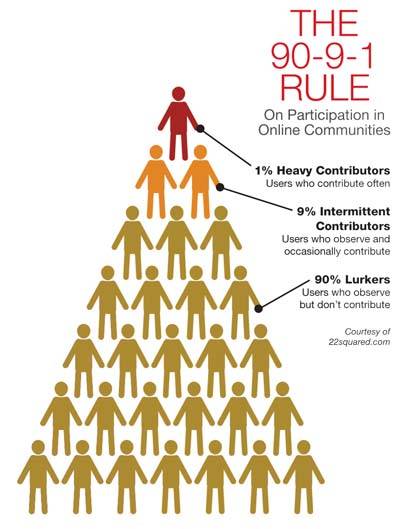The 1 Percent Rule: Why a Few People Get Most of the Rewards in Life
At some point in the late 1800s, a man named Vilfredo Pareto was whining about in his garden when he made a little however interesting discovery.
Pareto saw that a tiny number of pea pods in his garden delivered most of the peas. Now, Pareto was an extremely numerical individual.Imagine a scenario where unequal distribution was present in other areas of life as well?
The Pareto Principle
At the time, Pareto was contemplating riches in different countries. As he was Italian, he started by investigating the dispersion of riches in Italy. Amazingly, he found that roughly 80 percent of the land in Italy was claimed by only 20 percent of the general population. Like the pea pods in his garden, the majority of the assets were controlled by a minority of the players.
Pareto proceeded with his investigation in different countries and an example started to develop. For example, in the wake of poring through the British wage assess records, he saw that around 30 percent of the populace in Great Britain earned around 70 percent of the aggregate salary. 
As he kept examining, Pareto found that the numbers were never fully the same, yet the pattern was amazingly reliable. The dominant part of prizes dependably appeared to accumulate to a little level of individuals. This thought few things represent most of the outcomes wound up known as the Pareto Principle or, all the more ordinarily, the 80/20 Rule.
Inequality, Everywhere
In the decades that took after, Pareto's work basically moved toward becoming gospel for business analysts. When he opened the world's eyes to this thought, individuals began seeing it all around. Furthermore, the 80/20 Rule is more common now than any time in recent memory.
For instance, through the 2015-2016 season in the National Basketball Association, 20 percent of establishments have won 75.3 percent of the titles. Moreover, only two establishments—the Boston Celtics and the Los Angeles Lakers—have won almost 50% of the considerable number of titles in NBA history. Like Pareto's pea pods, a couple of groups represent most of the prizes.
The numbers are significantly more outrageous in soccer. While 77 distinct countries have contended in the World Cup, only three nations—Brazil, Germany, and Italy—have won 13 of the initial 20 World Cup competitions.
Cases of the Pareto Principle exist in everything from land to pay imbalance to tech new companies. In the 1950s, three percent of Guatemalans possessed 70 percent of the land in Guatemala. In 2013, 8.4 percent of the total populace controlled 83.3 percent of the world's riches. In 2015, one web index, Google, got 64 percent of pursuit inquiries.
For what reason does this happen? For what reason do a couple of individuals, groups, and associations appreciate the greater part of the prizes throughout everyday life? To answer this inquiry, how about we think about a case from nature.
The Power of Accumulative Advantage

The Amazon rainforest is a standout amongst the most differing biological systems on Earth. Researchers have recorded roughly 16,000 diverse tree species in the Amazon. In any case, in spite of this amazing level of decent variety, specialists have found that there are around 227 "hyperdominant" tree species that make up almost 50% of the rainforest. Only 1.4 percent of tree species represent 50 percent of the trees in the Amazon.
why?
Envision two plants developing one next to the other. Every day they will go after daylight and soil. On the off chance that one plant can become only somewhat quicker than the other, at that point it can extend taller, get more daylight, and splash up more rain. The following day, this extra vitality enables the plant to become considerably more. This example proceeds until the point that the more grounded plant swarms the other out and takes the lion's offer of daylight, soil, and supplements.
From this beneficial position, the triumphant plant has a superior capacity to spread seeds and duplicate, which gives the species a considerably greater impression in the people to come. This procedure gets rehashed and again until the plants that are marginally superior to anything the opposition rule the whole woodland.
Researchers allude to this impact as "aggregate preferred standpoint." What starts as a little favorable position gets greater after some time. One plant just needs a slight edge at the outset to swarm out the opposition and assume control over the whole timberland.
Winner Take-All Effects
Something comparable occurs in our lives.
Like plants in the rainforest, people are frequently seeking similar assets. Legislators vie for similar votes. Creators vie for a similar spot at the highest point of the hit list. Competitors go after a similar gold decoration. Organizations go after a similar potential customer. Network shows go after that hour of your consideration.
The contrast between these choices can be razor thin, yet the victors appreciate enormously outsized prizes.
Envision two ladies swimming in the Olympics. One of them may be 1/100th of a moment quicker than the other, however she gets the greater part of the gold decoration. Ten organizations may pitch a potential customer, however just a single of them will win the undertaking. You just should be somewhat superior to the opposition to secure the greater part of the reward. Or on the other hand, maybe you are applying for another activity. Two hundred applicants may vie for a similar part, however being simply somewhat superior to anything different competitors gains you the whole position.
Thanks for reading, please follow <3
Wow I never really thought of things this way before
Very well written! Didn't know this phenomenon was attributed to a person. Thanks, learned something today!